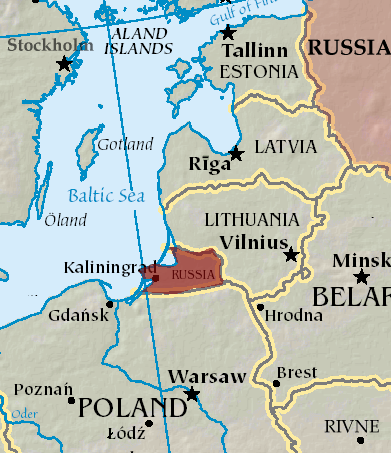Poland Plans Barrier Along Border with Russian Kaliningrad
The Russian alcove of Kaliningrad shares a border with Poland (Wikimedia Commons).
Migration continues to dominate the politics of Eastern Europe, as suspicions have grown about possible Russian plans to destabilize the European Union (EU) by facilitating the crossing of African and Asian migrants into the EU. On October 25, a top Polish official announced intentions to build a barrier along its border with the Russian enclave of Kaliningrad, according to Sky News.
As the war in Ukraine continues to intensify, Poland fears a repeat of the 2021 crisis in which Belarus orchestrated the migration of thousands of African and Middle-Eastern migrants into Poland, Lithuania, and Latvia, all of which are members of the EU and NATO, reports Reuters. Recently, Kaliningrad has opened up to flights from Asia and the Middle East in an effort to attract more tourists and airlines, leading to concern that they may attempt the same migration gambit.
General Secretary Krzysztof Sobolewski of Poland’s ruling Law and Justice party announced that Poland is considering a barrier along its border with Kaliningrad. This barrier would be similar to the one it recently constructed along its border with Belarus: an 18-foot-tall barrier stretching 116 miles equipped with motion sensors and cameras. Sobolewski told reporters that Poland “will have to strengthen our forces in this section of the border and also consider… building similar border fortifications to those [Poland] now has on the Polish-Belarusian section.” He added that Poland “must do everything to prevent this hybrid war involving illegal immigrants from succeeding.”
This occurs all the while Belarus’s migration crisis remains unresolved. While the border wall has effectively decreased the number of attempted crossings, Poland’s Human Rights Commissioner has warned that the humanitarian crisis at the border is far from over. Various Polish and international human rights groups have accused authorities on both sides of the border of inhumane treatment of those looking to cross.
The border has also raised environmental concerns from scientists and the European Parliament because it is supposed to run through protected natural areas. Poland has pushed back against these concerns, arguing that it has a responsibility to protect its border and the European Union’s eastern frontier from illegal entry. Despite this criticism, states such as Germany have praised Poland for its commitment to border control, according to the news service Notes From Poland.
Poland hopes to build an “electronic barrier” of sensors and cameras between Kaliningrad over the first three quarters of 2023, which will stretch roughly 125 miles.
Russia has denounced Poland’s border wall plans as “stupidity,” according to Sky News. Kremlin spokesman Dimitry Peskov stated that “history proves the stupidity of decisions to build walls every time, because over the years or decades, all walls fall.”
Poland’s decision to build a border wall and Russia’s reaction further emphasize the growing relevance and potential consequences of borders, migration, and geopolitics in the region. As tensions between Russia and the West rise, other states on the Eastern frontier may choose to take such drastic measures to control their borders.

